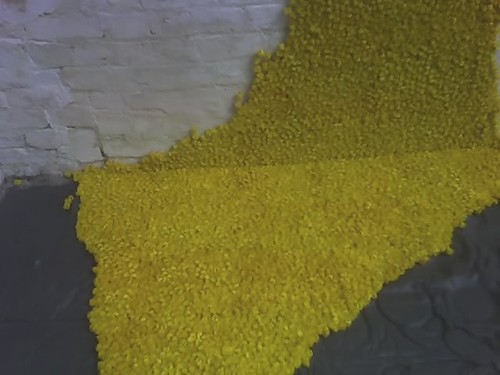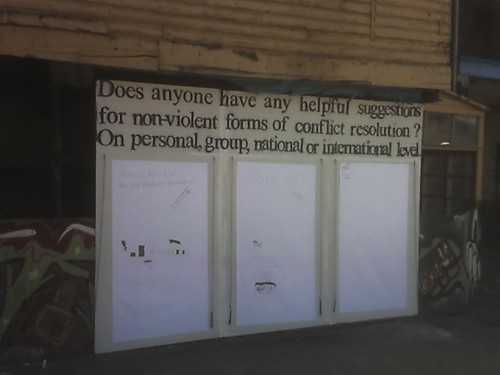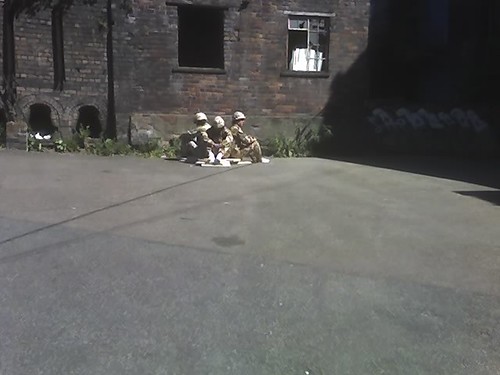Now, I don't like to use the words Web 2.0 very often, but many loyal readers know that I am something of an enthusiast - some might say a hopeless addict - of the new toys the web has to offer.
There are many worthy reasons to be using the internet, but what is really fuelling its development is fun. People spending an enormous amount of time, beavering away for their own entertainment and possibly the attention of others. Some of them do it for reward but many don't. Some of the most popular sites on the web are the likes of Youtube and Google Video. Links to funny, short videos - as well as more graphic ones - are being circulated in masive numbers across the workplaces and schools of Britain. Meanwhile social networking sites are now being credited for breaking new music acts and sucking away the time of schoollchildren.
Web 2.0 is all about the reshaping of the internet to support people-based connections and creativity. It isn't top-down, which is why many of the efforts of newspapers to get involved look so out-of-place. Many people are getting online simply because they feel they should, without realising that there is a need to commit real people to take time and possibly waste time in order to - possibly - deliver their goals. The masses don't need to be told what to look at or buy any more, they can make their own decisions, based on their own whims and the influences of those they trust.
This genuine plurality of voices on the web is down to a simple factor. For the first time - and it might not last - it is possible to do share just about anything you like on the web for free. We have the freedom to be adventurous, to decide what we want to do and then find out how to do it. Want to be a photographer, a famous band, build your very own peaceloving commune, video yourself on the phone you got for free dancing madly in motorbike gear? It's all there to do and you don't have to pay hosts or website builders anymore. Nearly all the free tools have the addition of community. Flickr is the perfect example. Ostensibly a site where you can get your photos online for free, you can also link up to your friends there, you can leave comments on other people's photos and display your photos in multiple sexy ways without any technical skills whatsoever.
So we go back to that old question: where does it leave the creative industries? Many of our jobs involve choosing what people should listen to, read, see and think. We've been the builders of culture and suddenly the bricks have been taken off us. There are all sorts of delightful things we can do on the web, but can they make us a living? My sense is that the money will come. This post has been primarily about Britain which not only has relatively very high levels of wealth but also deflation, as the people still selling real stuff put their prices down to compete in the new economy and sell to a population that might be willing to spend and borrow money for things that might be called non-essentials (or useless, like ringtones) but has the time to shop around and wants things cheap. Offers are everywhere: we now have a situation where it is difficult to even switch mobile phones without being forced to bring another new phone into the world, with its attached camera, video, music player, recorder, flip-top, conflict-fuelling cobalt, funky wallpapers and flashy lights. A flick onto Bluetooth and ubiquitous broadband later and we're all publishers. I for one am enjoying the opportunity to extend White Llama's tedious musings of consciousness into the dimension of rather fuzzy and dull photostreams.
What about the rest of the world? I estimate it took about 3 years for the UK web and our computers to go from being sticky and slow to fast and simply helpful. As web infrastructure moves further into the world and people in more countries develop economic power, these tools will extend too. Perhaps other countryfolk won't take quite so much time buggering about sending each other photos of their topless girlfriends, but I'm probably wrong.
As Justin Timberlake said, it's important to breathe. Practice a little discernment, think about what you want to do and why, but then know that you can do it. Be adventurous. Enjoy breaking down walls and making connections, searching for our place in a new world.
Weaving words. All views are my own, unless otherwise indicated, and may have changed by the time you read them.
Saturday, July 22, 2006
Sunday, July 16, 2006
Tuesday, July 11, 2006
May the Daily Mail be minced, slowly
I managed to catch a bit of the event by Alertnet (linked right), whose Media Player stream was inaccessible until someone in Caifornia helpfully supplied a stream which was usable across platforms.
As we at Never Again in London are hoping to host a seminar which looks at many of the same issues, I was interested to see how they approached the topic and honestly, whether it was worth putting ours on at all.
They had a catchy hook for the event - on reporting about children in the most dangerous places, but this seemed to lead to disappointment from many of the bloggers listening when the debate turned mainly on the operations of NGOs and the press rather than child voices. The section I heard most clearly involved a journalist criticising the luxurious conditions in which NGOs operate in. And everyone laughed. The other clear message, from the Daily Mail at least, was that 'our readers' aren't interested in local voices. They want to know what their familiar white commentators have to say on an issue, they want to see people just like them, caught in a crisis.
The newspapers often convey this clear impression of their readers desires but I've rarely seen them test it. Their readers are generally portrayed as being as callous as they are in the newsroom or otherwise fleeing, 'switching off' from the hopeless and the bad. And yet that doesn't stop them flogging lame Labour government stories at us every day.
I read Global Voices most days and would be amazed if there wasn't a huge audience for this well edited, interesting content that synthesises points of views and colours news with experience. The bleak every day reality of daily bombings is rarely hopeless if you take with it the humour and good nature of real people who, I barely need remind you, live with this reality every day. From Israel to Rwanda, it is the countries with the greatest turmoil that show those of us in the fat west that life is to be lived.
Journalists don't give their readers the chance to be interested in humanitarian crises because they're all lazy. The woman from the Mail, I shall call her simply *that woman*, proved it as she mentioned that blogs are "notoriously unreliable". Which in a world of *millions* of blogs is even more ridiculous than calling all journalists lazy. You might as well call all people liars, unless they work for the Daily Mail. Many blogs are unreliable, as White Llama fans well know, but many just tell the truth as they see it. Not unlike journalists.
A rather angry blogosphere was much diminished by the end of the seminar, when the IRC representative suddenly fired a shot across the room which, I hope, will bring a slight chill to mainstream newsrooms across the country. As the seminar had been going on, a series of bombs across India - as large in their scale as the London bombs which still dominate the British press - were being reported and depicted on the web, eyewitnesses were Skypecasting and Flickring, bloggers were beng heard, more bloggers were synthesising, hours before the newspapers will hit the stands. Not for the web the inanity of repetitive, mawkish rolling coverage, the voices and images of that news will be heard on the web. The room erupted into applause, proving that the passion is in the blogosphere and the press is being trodden underfoot; chip paper today.
So what, you undoubtedly wanted to know paragraphs ago, does all this mean for our seminar to discuss media and the Responsibility to Report? Almost certainly that it's like trying to stuff ten cats into a sack (forgive the simile, it's not real). Possibly that it's time for the mainstream media to seriously start engaging in the conversation before they find that all their readers have gone.
Now, I'm riddled with hostility towards the British newspaper industry. I hate hate hate it and the likes of that woman. This isn't good. I accept a pressing need for work on the conflict inside myself. After all, mainstream news organisations provides the money for journalism and I'm in absolutely no doubt that we need journalists. A democracy means paying the people who ask the questions as much as we pay the people who make the decisions. Journalism is a lot more than simply a collection of what people want to write, it is often about exposing what nobody wants to read. Like many spheres, it isn't the people who are evil, but the structures that lead people to decide that genocide isn't news until the victims look more like 'us'. That's the dilemma I hope we will be able to make progress on.
Oh and as for the children? Give them all blogs. Record their stories, their views. The Daily Mail ain't interested in you, little ducks, but plenty of others will be.
As we at Never Again in London are hoping to host a seminar which looks at many of the same issues, I was interested to see how they approached the topic and honestly, whether it was worth putting ours on at all.
They had a catchy hook for the event - on reporting about children in the most dangerous places, but this seemed to lead to disappointment from many of the bloggers listening when the debate turned mainly on the operations of NGOs and the press rather than child voices. The section I heard most clearly involved a journalist criticising the luxurious conditions in which NGOs operate in. And everyone laughed. The other clear message, from the Daily Mail at least, was that 'our readers' aren't interested in local voices. They want to know what their familiar white commentators have to say on an issue, they want to see people just like them, caught in a crisis.
The newspapers often convey this clear impression of their readers desires but I've rarely seen them test it. Their readers are generally portrayed as being as callous as they are in the newsroom or otherwise fleeing, 'switching off' from the hopeless and the bad. And yet that doesn't stop them flogging lame Labour government stories at us every day.
I read Global Voices most days and would be amazed if there wasn't a huge audience for this well edited, interesting content that synthesises points of views and colours news with experience. The bleak every day reality of daily bombings is rarely hopeless if you take with it the humour and good nature of real people who, I barely need remind you, live with this reality every day. From Israel to Rwanda, it is the countries with the greatest turmoil that show those of us in the fat west that life is to be lived.
Journalists don't give their readers the chance to be interested in humanitarian crises because they're all lazy. The woman from the Mail, I shall call her simply *that woman*, proved it as she mentioned that blogs are "notoriously unreliable". Which in a world of *millions* of blogs is even more ridiculous than calling all journalists lazy. You might as well call all people liars, unless they work for the Daily Mail. Many blogs are unreliable, as White Llama fans well know, but many just tell the truth as they see it. Not unlike journalists.
A rather angry blogosphere was much diminished by the end of the seminar, when the IRC representative suddenly fired a shot across the room which, I hope, will bring a slight chill to mainstream newsrooms across the country. As the seminar had been going on, a series of bombs across India - as large in their scale as the London bombs which still dominate the British press - were being reported and depicted on the web, eyewitnesses were Skypecasting and Flickring, bloggers were beng heard, more bloggers were synthesising, hours before the newspapers will hit the stands. Not for the web the inanity of repetitive, mawkish rolling coverage, the voices and images of that news will be heard on the web. The room erupted into applause, proving that the passion is in the blogosphere and the press is being trodden underfoot; chip paper today.
So what, you undoubtedly wanted to know paragraphs ago, does all this mean for our seminar to discuss media and the Responsibility to Report? Almost certainly that it's like trying to stuff ten cats into a sack (forgive the simile, it's not real). Possibly that it's time for the mainstream media to seriously start engaging in the conversation before they find that all their readers have gone.
Now, I'm riddled with hostility towards the British newspaper industry. I hate hate hate it and the likes of that woman. This isn't good. I accept a pressing need for work on the conflict inside myself. After all, mainstream news organisations provides the money for journalism and I'm in absolutely no doubt that we need journalists. A democracy means paying the people who ask the questions as much as we pay the people who make the decisions. Journalism is a lot more than simply a collection of what people want to write, it is often about exposing what nobody wants to read. Like many spheres, it isn't the people who are evil, but the structures that lead people to decide that genocide isn't news until the victims look more like 'us'. That's the dilemma I hope we will be able to make progress on.
Oh and as for the children? Give them all blogs. Record their stories, their views. The Daily Mail ain't interested in you, little ducks, but plenty of others will be.
Friday, July 07, 2006
Having initally dithered over whether to go into London, I was quite upset to find all the trains in and out of Euston cancelled this morning and the announcer on the train telling people only to go to Euston if they 'had urgent appointments'. Just like last year. There was very mixed information at the station, whose staff didn't seem to have been told anything and so could only increase uncertainty.
With the patrols back and many sniffer dogs - though not guns - I thought this would be a quiet but calm day in London. It probably is. I'd rather be with a crowd of Londoners than in Stoke today.
Anyway, it could be worse. My thoughts are with the survivors and relatives today.
With the patrols back and many sniffer dogs - though not guns - I thought this would be a quiet but calm day in London. It probably is. I'd rather be with a crowd of Londoners than in Stoke today.
Anyway, it could be worse. My thoughts are with the survivors and relatives today.
Subscribe to:
Posts (Atom)



